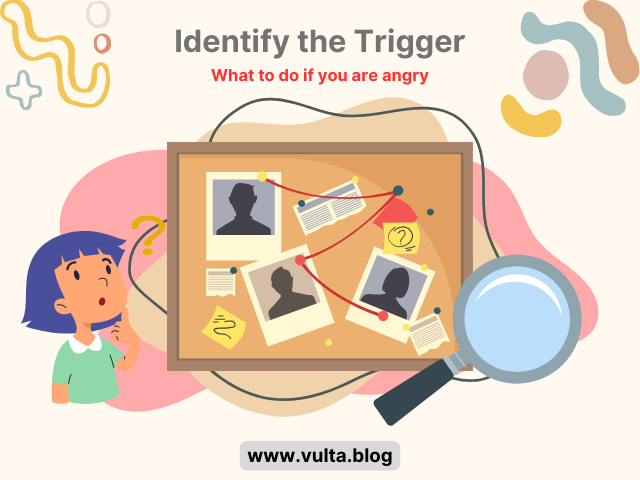How to control your temper? What to do if I am Angry?
In this blog post, you will be informed about the simplest and most effective methods for managing your temper as well as handling the temper of others.

Are you even Angry at the first place?
Before we start talking about ways to pacify your anger, we must first identify whether you are angry in the first place.
If you want to skip this part then click here.
How to know if you are angry
If you found this blog post via search results, then either that you already know that you yourself is angry or that you want to pacify somebody else’s anger.
If it is the former, then skip this part of the blog post and check the “What to do if you are Angry?” section that is located further down below. Otherwise, continue reading.
Physical sensations
Anger can manifest in various physical sensations. When you experience anger, your body goes through a series of physiological changes as part of the "fight-or-flight" response, which prepares you to deal with a perceived threat or challenge.
The following are effects on how anger affects the body:
- Increased heart rate;
- Tense muscles;
- Accelerated Breathing;
- Digestive Issues;
- Sleep Disturbances;
- A flushed face; and
- The clenching of jaw, grinding of teeth, etc.
Changes in Behavior
When angry, people tend to exhibit behavioral changes.
These can include:
- Raising your voice;
- Aggressive body language;
- Engaging in argumentative or confrontational behavior;
- Becoming more impulsive;
- Etc.
Behaviors can also change with the intent to avoid or escape the problem entirely—behaviors like stonewalling.
Stonewalling or “shutting off” can refer to the refusal to communicate or cooperate—it is where you limit what you are aware of emotionally by ignoring people or events, so that you do not burst out in anger.
Anger can sometimes result in emotional outbursts, such as yelling, screaming, or crying.
Cognitive Signs
Anger can influence your thoughts and perception.
You might find yourself dwelling on negative thoughts, having an increased focus on the person or situation that triggered your anger, or experiencing racing thoughts and difficulty concentrating on other matters.
When angry, you might find yourself:
- Dwelling on negative thoughts;
- Having an increased focus on the person or situation that triggered your anger; and
- Having difficulty concentrating on other matters.
What to do if you are Angry
The following are only applicable if you are trying to pacify your own anger.
If you are looking for a way to influence somebody to calm down or deal with their anger, then I suggest you skip this part of the blog post and read “How to Influence Someone to not be Angry”, it is located further down below.
This is not a step by step process nor is it a hierarchy from best to worst. The following are simply methods on how to deal with your anger.
Identify the trigger

First things first, identify what triggered your feeling of anger—the cause of your anger.
Most of the time, the answer is obvious—it’s the latest obnoxious event that has happened, sometimes however, the cause of a sudden outburst originates from the past, something that has happened long before.
Once identified, seek guidance from either a professional, a close friend, or even a spiritual figure.
Take a break / Take a breather / Seclude yourself

Stay away from the source or any entities that is related to any of your problems, especially the main one.
Sometimes, a nap or a long rest is enough for the fuming feeling to depart.
This can prevent you from reacting impulsively and allow you to gather your thoughts.
If you still feel anger even a pint of it, then I suggest you channel this anger to one or multiple healthy outlets—examples of healthy outlets can be found further below.
Secluding yourself is a valid response to pacify your anger, it grants you time for self-reflection and prevents you from harming yourself and others.
Acknowledge that you are angry

Sometimes, acknowledging that you are mad and not in the right state of mind is enough for you to calm down.
Self-Talk
Engage in positive self-talk to shift your mindset. Remind yourself to stay calm and use affirmations or calming statements to redirect your thoughts away from anger.
Talk about it with a trusted person
Talking about your problems with another person can work as an outlet for where your anger goes through.
When you share your feelings and experiences to others, you lessen the burden of carrying those problems alone.
It is preferable that you talk to a trusted friend, family member, or therapist about your anger about personal problems.
Talking to strangers about your problems is fine, as long as you are never going to see them again and that they are not connected in any way of your life or because the problem is simply not that sensitive to talk about.
If the person’s wise or educated, then they can also provide perspective, guidance, and support in managing the source of your temper/problem.
Find other Healthy Outlets
Examples of healthy outlets can be found here.

Seek Professional Help
IF you suspect that your anger is chronic, seek professional help immediately. Chronic anger can have several negative effects on an individual's physical and mental well-being.
Risks associated with chronic anger:
- Physical health problems;
- Mental health issues;
- Impaired decision-making and judgment;
- Heightened stress levels; And
- Increased conflict and aggression (Persistent anger often leads to a cycle of conflict and aggression).
How to Pacify The Anger of Another Person
The approaches above (What to do if you are angry) can also work if your goal is to pacify somebody else’s anger. You just have to change the focus on the methods from you to them.
Stay calm yourself
When dealing with an angry person, it's crucial to remain composed. Don’t get caught up by their spirit, otherwise both of you will ruin yourselves.
By staying calm, you can set a positive tone and help create a more peaceful atmosphere.
Active listening
Give the person your full attention and actively listen to what they have to say. Show empathy and understanding by nodding, maintaining eye contact, and providing verbal affirmations.
Let them express their thoughts and emotions without interrupting.
By actively listening, you effectively lessen the burden of carrying their problems, which should pacify their anger.
This will also give you the chance to identify what caused them to be so angry.
Validate their feelings
Acknowledge and validate the person's emotions. Let them know that you understand their perspective and that their feelings are valid.
Because in doing so, you make them feel heard and may contribute to a sense of relief.
Express empathy
Demonstrate empathy by putting yourself in their shoes and trying to understand their point of view.
Avoid being judgmental or dismissive. Show that you genuinely care about their concerns and want to find a resolution.
It is important that you do not lie here, because once this is sensed, you lose all influencing prowess over them.
Avoid escalation
Anger can sometimes make people defensive and resistant. Stay patient, avoid responding with anger, and refrain from getting defensive yourself.
Maintain a non-confrontational and understanding attitude, even if the other person's anger persists.
Choose your words carefully
Avoid raising your voice and any topics that aggravates him/her. Engage in open and honest dialogue, focusing on finding common ground and resolving the issue together.
Offer an escape
Sometimes offering an escape like watching a movie, smoke break, playing a tabletop game, and other outlets—good or bad is needed to ease off the tension.
Doing this will result in you having more time to prepare on what to say and a better atmosphere to talk about their problems—as long as you play your cards right.
Be careful and be patient
If the person's anger becomes aggressive, disrespectful, or harmful, it is important to prioritize your own safety and well-being.
In extreme cases, involving appropriate authorities or seeking professional help may be necessary.
Copyright ©2023, ©2024 by Marshall Vulta
Last revised: February 10, 2024





Comments ()